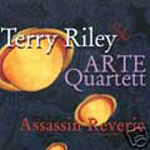|
|
 |
Dusted Reviews
Artist: Terry Riley Album: Assassin Reverie Label: New World Review date: Feb. 12, 2006 |

|
|
|
 |
Old school compositional maverick and early drone pioneer Terry Riley is always worth listening to. Though his works are usually distinctive and recognizably Riley, some of his greatest successes to my ears have come through his collaborations with specific ensembles (those with the ROVA Saxophone Quartet and the Kronos Quartet stand out). More often than not, it seems that Riley’s synthesis of early minimalist strategies, South Asian musics and long-form drones works best when he conceives in terms of specific instrumental voices (and personalities). It’s no surprise, then, to see him working with the Arte Quartett (Beat Hofstetter, Sascha Armbruster, Andrea Formenti and Beat Kappeler), who have in recent years become a first-call new music saxophone quartet.
Ever the musical traveler, Riley seems here equally concerned to shed all his earliest influences (particularly those of his compositional training) and to give vent to some of his favorite idioms, notably the blues and Indian microtonal music. And as ever, there is a healthy bit of modal playing and improvisation on these performances. The three-part “Uncle Jard” almost gives you a snapshot of Riley in this particular mood. Part one features long, plangent drones with Riley’s own harmonium and faux carnatic vocals; part two features his almost-blues piano with honking, lower-register sax riffs; and part three races through the kind of tough counterpoint sections familiar from Riley pieces like “Half Wolf Dances Mad in Moonlight.” Riley’s own contributions are certainly quite eccentric and aren’t always the most convincing (indeed, his vocals can be a bit trying).
But when he leaves the saxophonists to do their thing – as on the title track (where Kappeler supplements the ensemble with sound design and effects) or the 1965 piece “Tread on the Trail” (with its 12 overdubbed saxophones) – the music is really excellent, shimmering with life and brimming with detail. Cleary enamored of rhythmic patterns and interlocking phrases or cells, Riley isn’t after complexity so much as he’s keen to explore the seemingly innumerable dangers of relatively pared down structures. I’ve never heard him explore the sheer noise and dissonance that explodes in the middle of “Assassin Reverie,” and it sounds great (though its ending is somewhat more bucolic, with very jazz-inflected tenor). And the gorgeous, flowing “Tread on the Trail” is a real delight, both rhythmically insistent and quite liquid as the grouped saxophones spread over you. So in other words, while the piece perhaps closest to old Riley’s heart (“Uncle Jard”) is the sketchiest, this recording is redeemed by its companion pieces.
By Jason Bivins
|







